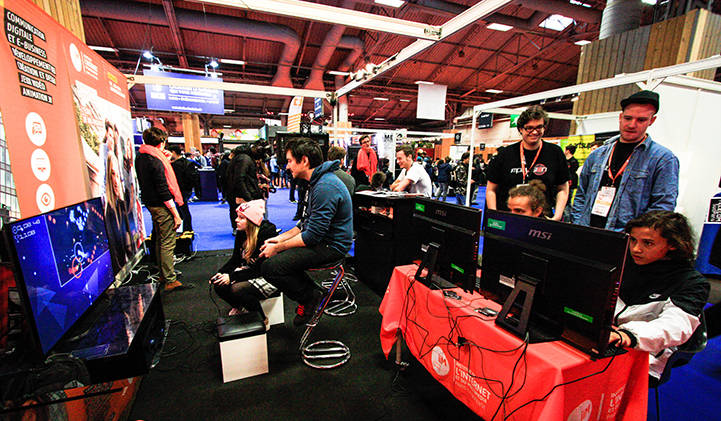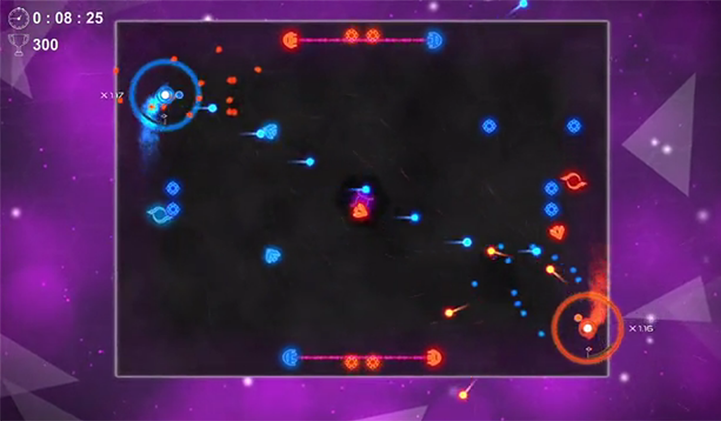6 Indie Video Games Developed by Students

Imagination, passion, dedication are what it takes to create great indie video games. No need for big budgets to develop unique decors and addictive gameplays. Proofs are the following indie video games developed by students from Parisian digital school IIM.
Over the last months, many indie video games developed by students, as part of IIM’s learning by doing approach, have been noticed by professionals of the industry and are in the process of being edited.
Impulsion, a first person platformer
By Rémi Bertrand, Maxime Lupinski and Hugo Verger
Impulsion is a first-person game which takes the player into a space station: the only way the player can get out is to pass dexterity and logic tests, using force-field guns and of course racing against time. Waking up in the middle of the space station, the player is a robot who must prove it’s gifted enough to leave the station. Failing during a test leads to death most of the time and takes the player back to Room 1. All rooms were designed to be quick, with a growing difficulty level and above all timed : all of this makes Impulsion a very addictive game, for players are tempted to start the game over and over until they beat their own score.
Impulsion has won a Ping Award at the ’17 Paris Games Week and was nominated in the Student category at the latest Game Awards.
A Knight’s Ascension, VR third person platformer
By Alain Beteille, Adrien Dumarché, Quentin Delas, Jeffrey Le Bris, Cristian Ciobanu
A Knight’s Ascension is a virtual reality third person platformer. The player controls a character and helps him climb a tower to the top, while resolving riddles and avoiding traps. The player uses the controller to have the character move around and to operate within the environment. The setting is fantasy medieval universe, recreated in virtual reality. VR enables an immersion in the game, the levels litteraly revolve around the player wearing the goggles, creating a unique gameplay. The player is not subject to dizzyness, as they can move exactly when and how they want to.
Cells, a cooperation shoot’em up
By Niels Couëffë and Alexandre Huger, IIM graduates, members of RedwoodStudio
The indie video game has been developed mainly for the cooperation mode between two players. Each of them controls a cell of a different color, either blue or orange, and can only destroy enemies of the opposite color. Coordination and fast thinking are the players’ main weapons, beside the ability to revive and merge with their teammate. Levels become harder and harder, and players fight against unique bosses.
Poly Maze, a reflexion platformer
By Corentin Guillaume
Poly Maze combines the platform and reflexion genres. It was designed for occasionals players, in the 20 to 35 age bracket. The player controls a white ball through over a hundred spherical labyrinths. Players must also avoid obstacles, holes and traps. Passing levels requires reflex and precision. Poly Maze’s setting is retrofuturistic, with a top platform view.
Poly Maze should be available on Switch in the months to come.
Shieldwall, a mobile runner party game
By Antoine Manin (Level Designer), Nicolas Gaudrat (Developper), Grégoire Champetier de Ribes (Graphic designer), Sylvain Bribard (Game Designer) and Aurore Garcia (Marketing)
When playing ShieldWall on their smartphone (Android or iOS), players must control a horde of vikings bringing mayhem everywhere they go. The students who created Shieldwall know how boring runner games can become after a while. That’s why they have chosen to diversify the gameplay by adding mini games. The latter require strong reflex from the players.
Telepath, a puzzle game
By Antoine Poujaud, Alexis Hebras, Jean-Baptiste Day, Romain Dupire
Controling a robot who landed on an unknown planet and helping it find its way home. A long and difficult path awaits Telepath players. Through different worlds, whether dreamlike or hostile, players must solve riddles and help the robot escape enemies along the way. The two phase gameplay is unique, with 2D isometric environments.
Telepath is still being developed by students using Unity, it will eventually be available on smartphones.
Training students to become professionals in a growing sector
IIM’s video game department trains students on technical, artistic and strategic levels. The course’s main objective is to train future professionals of a booming-field to master advanced technical skills combined with a global marketing vision. The project mode enables students to put into practice their knowledge and create professional quality video games.


